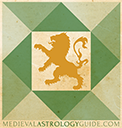Planets Are People Too
Perhaps a silly statement, the idea of personifying the planets as people is timeless. In Babylon, the planets were seen as the seat of specific gods, and by keeping track of their motion, priests were able to obtain some insight on the will and workings of these deities. We don't have to be Babylonian astral priests to learn a thing or two about the planets and how they function in astrology.
The primary function of a planet is to do something. Planets act. We know planets act because the planets move and it's only through a system of motion that change occurs and things happen. This is very different from other foundational pillars of astrology like signs and houses which have different functions and do not act or cause change.
In modern types of astrology, the planets are not regarded as people, but as internal, psychological processes. This was a necessary change introduced in order to move the language used in astrology from an event and prediction based language to one of tendencies and character analysis in response to legal troubles in the early 1900s. This is the point in history where the planets lost their personhood.
Every planet has a job assigned to it at the moment of birth, these jobs are unique to each person dependent on their natal chart, but they each have a job all the same. Even though planets all have jobs to do, they don't complete those jobs in the same way. Each planet operates in a way that remains true to its basic nature. Mars and Venus do not employ the same methods to get the same job done.
This is where thinking of the planets as people comes in handy. By thinking of Venus as a person, it becomes easier to identify with and interpret her position or situation in each individual chart. Instead of trying to memorize placements or meaning, you can just ask yourself how you would feel in her shoes. How would you feel if you were in a cadent house? How would you feel if you were peregrine? How would you feel to be in a square with Saturn?
Because medieval astrology sees the planets as actors with purpose and volition similar to humans, many of the aphorisms or explanations provided are written as analogies involving people. A retrograde planet, for instances is like a man walking backwards. A combust planet is like a person recovering from a fever. A planet stationed direct is like someone moving forward with renewed hopes. A planet in their sign of domicile is like someone in their own home. The list goes on and on. What's interesting is that this idea of the planets acting like people is so ingrained into the tradition that they are even referenced by gender pronouns he and she while modern texts tend to refer to them all as the inanimate gender-neutral pronoun "it".
This approach tends to make astrology more accessible and concrete. Medieval astrology is less focused on exploring the depths of how someone feels or thinks about a topic and more focused on providing insight into how well that thing is objectively functioning by determining how well that planet is doing that job. That's not to say that the internal processes of a planet are ignored completely; a Mars that is incapable of performing a job well will fail to do all of it's jobs well, including managing anger. The internal takes a back seat to the external and determines how well those things are manifesting in the native's life.
With this in mind, the next time you look at your natal chart think about the planets as people. See whether they enjoy their environments or not and how that might effect their ability to perform at their jobs.

